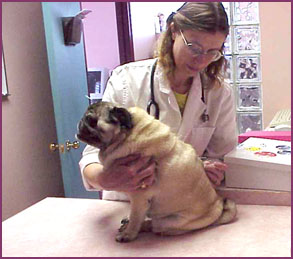
Dr. Nancy Ridder spent 150 hours in a classroom, wrote a 4 hour exam, a case report as well as interned with another veterinary acupuncturist in order to become certified in acupuncture. She learned traditional Chinese medicine through the course, which gives her another tool in her toolbox to diagnose and treat your pet.
What is acupuncture?
Acupuncture is the insertion of needles into specific points on the body to cause a desired healing effect. This technique has been used in veterinary practice in China for at least 3000 years to treat many ailments. Acupuncture is used all over the world, either by itself or in conjunction with Western, conventional medicine, to treat a wide variety of maladies in every species of domestic animal and in exotic animals. Modern veterinary acupuncturists use solid needles, hypodermic needles, bleeding needles, electricity, heat, massage, and low power lasers to stimulate acupuncture points. Acupuncture is not a cure-all, but can work very well when it is indicated.
How does acupuncture work?
According to ancient Chinese medical philosophy, disease is the result of an imbalance of energy in the body. Acupuncture is believed to balance this energy and, thereby, assist the body to heal disease. In our Western terms, acupuncture can assist the body to heal itself by affecting certain physiological changes. For example, acupuncture can stimulate nerves, increase blood circulation, relieve muscle spasm, and cause the release of hormones, such as endorphins (one of the body’s pain control chemicals) and cortisol (a natural steroid). Although many of acupuncture’s physiological effects have been studied, many more are still unknown. Further research must be done to discover all of acupuncture’s effects.
Is acupuncture safe for animals?
Acupuncture is one of the safest forms of medical treatment for animals when a properly trained veterinarian administers it. Side effects of acupuncture are rare, but they do exist. An animal’s condition may seem worse for up to 48 hours after a treatment. Other animals may become sleepy or lethargic for 24 hours after acupuncture. These effects are an indication that some physiological changes are developing, and they are most often followed by an improvement in the animal’s condition.
Is acupuncture painful?
For small animals, the insertion of acupuncture needles is virtually painless. In all animals, once the needles are in place, there should be no pain. Most animals become very relaxed and may even become sleepy. Nevertheless, acupuncture treatment may cause some sensation, presumed to be those such as tingles, cramps, or numbness which can occur in humans and which may be uncomfortable to some animals.
How long do acupuncture treatments last and how often are they given?
The length and frequency of acupuncture treatments depend on the condition of the patient and the method of stimulation that is used. Stimulation of an individual acupuncture point may take as little as 10 seconds or as much as 30 minutes. A simple acute problem, such as a sprain, may require only one treatment, whereas more severe or chronic ailments may need a dozen treatments. When multiple treatments are necessary, they usually begin intensively and are tapered to maximum efficiency. Patients often start with 1-3 treatments per week for 4-6 weeks. A positive response is usually seen after the third, up to the eighth treatment. Once a maximum positive response is achieved, treatments are usually tapered off. Many animals with chronic conditions can be maintained with 2-4 treatments per year.
For which conditions is acupuncture indicated?
Acupuncture is indicated mainly for problems such as those that involve paralysis, pain, and noninfectious inflammation (such as allergies). The following are some of the general conditions which may be treated with acupuncture:
Musculoskeletal problems, such as arthritis, hip dysplasia, or spinal disc/ back problems
Skin problems, such as lick granuloma
Respiratory problems, such as feline asthma
Gastrointestinal problems
Selected reproductive problems
Nervous system problems such as facial nerve paralysis, seizures, etc
In addition, regular acupuncture treatments can treat minor sports injuries as they occur and help to keep muscles and tendons resistant to injury. World-class professional and amateur athletes often use acupuncture as a routine part of their training. If your animals are involved in any athletic endeavor, such as racing, jumping, or showing, acupuncture can help keep them in top physical condition.

